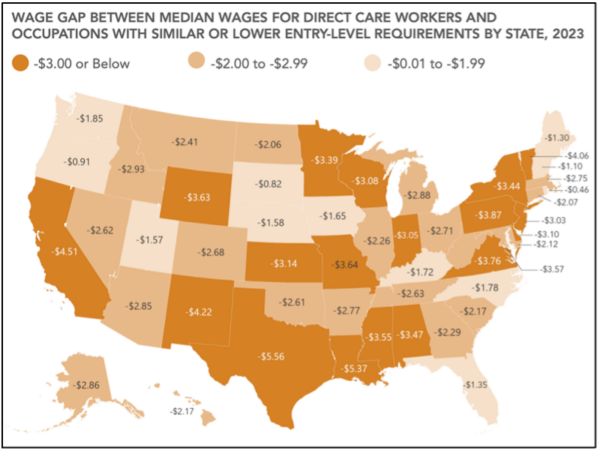The Senior Care Policy Briefing covers important long-term care issues by highlighting policy updates, news reports, and academic research.
Read the full Senior Care Policy Briefing below or download here.
November 15, 2024.
NEWSFLASH
NEWSFLASH
- USA Today Network New York reported that a total of 428 nursing homes across New York failed to meet the minimum staffing requirements mandated by law, with some facilities providing as little as one-third of the required care hours. Despite these serious violations, the investigation found that no fines have yet been issued.
-
- The NY staffing law, effective since 2022, requires each nursing home to provide at least 3.5 hours of daily care per resident. Though this is well below the 4.1 hours identified as necessary in a landmark 2001 study, only 30% of the state’s 606 nursing homes currently meet the standard.
- Eight individuals have been indicted for allegedly defrauding Medicaid of approximately $68 million through two social adult day care centers and a home health care intermediary. The scheme allegedly involved kickbacks and bribes for services that were not provided.
- Each defendant faces multiple charges, including health care fraud, conspiracy, and money laundering, with severe potential penalties including lengthy prison sentences.
LTC BY THE NUMBERS
- Brookdale Senior Living, the nation’s largest senior living operator, announced plans to acquire 41 senior living communities for $610 million. Brookdale’s CEO, Cindy Baier, highlighted the immediate financial benefits, including improved cash flow and lower capital costs.
- Unfortunately for residents, this acquisition could mean further strain on resources if the company focuses more on growth rather than improving care standards.
- According to federal data, the average Five-Star ratings for Brookdale Senior Living nursing homes are:
- Overall: 2.7
- Inspections: 2.5
- Staffing: 3.8
UNDERVALUED AND UNDERPAID
- According to a new factsheet from PHI, in 2023, direct care workers in all 50 states and Washington, D.C., earned less than workers in similar jobs in other industries. The hourly wage gap ranged from $0.46 in Rhode Island to $5.56 in Texas.
- This wage gap highlights the undervaluation of direct care workers, who provide essential support to elderly and disabled individuals. Low wages can lead to high turnover, burnout, and staffing shortages, directly impacting the quality of care.

“Direct care workers earned a median hourly wage of just $16.72 in 2023—a wage that has barely increased over the last decade when adjusting for inflation, despite growing demand for these workers.” – PHI
